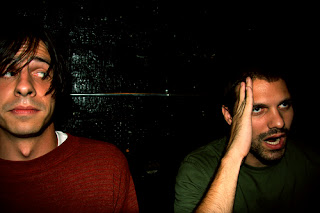Update: Some personal sources from MN are saying that apparently the death was by overdose. The exact words were "accidental overdose," but just how "accidental" these things are is always hard to pin down one way or the other. Again, though, my speculation below has more to do with what his music represented than the literal truth of whatever happened to him.
I only saw Eyedea perform once, opening for Atmosphere in 2001 or so. I was mostly impressed by the mind-boggling DJ Abilities, who would go on to make one of the definitive contributions to turntablism on Fantastic Damage. If Eyedea was always a little too conventional for my taste, that just shows how far to the edges those tastes tend to run - with his lightning-fast sprints and poetic flights, Eyedea sat right between conventional backpacker rap and the experimental stuff that remains my main jam to this day. He is, though, the first big death out of that cadre of rappers (who would have thought he'd be outlived by Cage?), so today's news really means something to me.
To treat him first as an individual: Though at the moment there's no news about cause of death, I'm willing to bet he killed himself. That kind of speculation may be out of place, but just think about his records. They had a pretty dark vibe overall, from the resentful bitterness of Firstborn to explicit references to overdosing on E and A. And his aggression was always a bit of the Holden Caulfield, angry-at-the-world variety (He was really young, but "Birth of a Fish" from Firstborn exemplifies this). The photos of him with his hair draped over his eyes seemed fully fitting. Some powerful art came out of whatever demons haunted him, but as in all these cases we have to ask whether it was worth it. Even if it turns out he didn't take his own life, those records were probably made by someone who struggled with depression, anxiety, and resentment. Serious artists in the business of looking at society are so often driven at least a little over the edge by the exercise.
But beyond that pure speculation, I wonder whether Eyedea's death can be considered a kind of convenient period at the end of the whole experimental/backpacker scene that flourished in the early part of the 2000s. The only really interesting and relevant records that have come out of that scene recently have been Why?s, and of course those are not rap records. The really good rap records these days have a much less serious vibe than what Eyedea was involved with in his heyday, and it's a shame (with the notable exception recently being Black Milk's Album of the Year). We also lost Rammellzee recently, and if anyone should remind us of the depression, shadow, and weirdness at the heart of hip hop, it was him. Eyedea was a child of Ramm, without question, and the fact that they went pretty close together is . . . well, Eyedea himself would probably say it was a coincidence in a cold and uncaring universe, while Ramm is probably on high doing the numerology of their respective end dates right now.
For whatever reason, and as harsh as it may sound, Eyedea died as the style he worked hard to champion was at a low ebb. Or is it? The same energy, and the same hype, is now surrounding weirdo R&B groups like Twin Shadow and How to Dress Well, who crack open the shiny, often upbeat core of R. Kelly Songs and George Michael crooning to find the darkness and even dread within. And you'll notice one thing - on balance, the artists making the cleaner, more commercialized versions of both hip hop and R&B tend to be black, while the people deconstructing those genres and making them more difficult tend to be white (yes, that's a generalization. Sorry). I think part of it is that more white artists have the ability to let their art live at the relative margins, while a lot of black artists feel the drive to hit the very top of the industry, and are willing to clean up what they're really feeling. As crazy as this sounds, what artists like Eyedea were doing was, at least in part, rescuing the really dark, painful, even twisted roots of black music - the pain of being black in America - from the cleaning up, or on the other hand hyperexaggeration, it often got from the music industry.
So, that's my overthought exploitation of a real man's very sad death. If your life's work is to interpret America - and if you're a rapper, that's your job description - and you take it seriously, you will confront darkness at every turn. Eyedea did that for us, so spend some time enjoying his work and considering the depths that it came from.

No comments:
Post a Comment